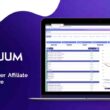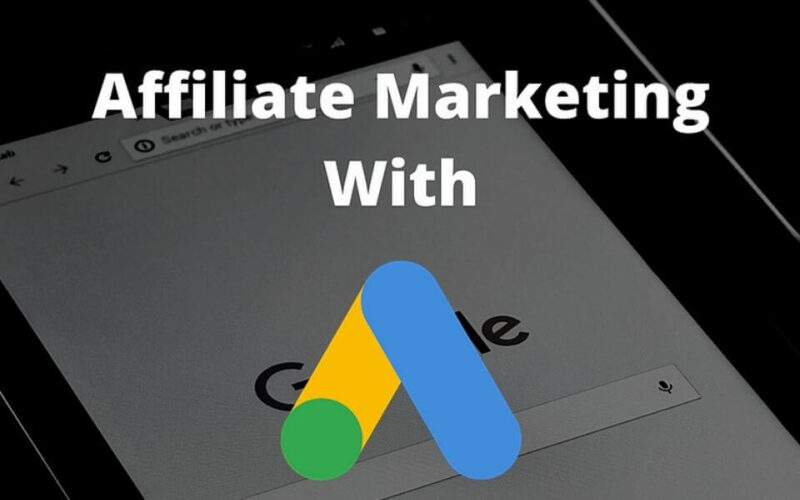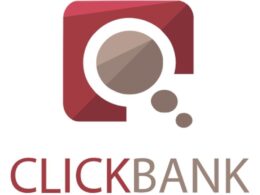Google Ads affiliate marketing is arguably the number one way businesses use to reach potential new clients over the Internet. For affiliate marketers, this is an awesome way to earn cash as they can reach a targeted audience at a very low price.
To succeed in affiliate marketing, your website needs to have a lot of high-quality traffic. And to achieve this, lots of affiliates turn to adverts, and who else to rescue them than one of the most popular contextual advertising networks which are Google Ads.
Google Ads was formerly known as Google AdWords; so don’t get confused when used interchangeably.
What are Google Ads?
Google Ads is an online advertising service that displays ads on web pages at the top, bottom, and sides of the site. Ads are generated by the system based upon the recent and former search phrases entered into Google by web surfers.
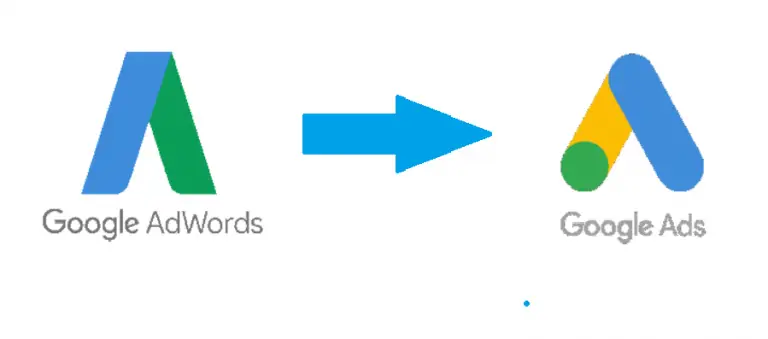
Google Ads affiliate marketing was originally launched in October 2000 and has become Google’s greatest source of income. In 2012, advertising revenues for Google neared $42.5 billion.
While working with Google Ads affiliate marketing seems easy and direct, it’s important to state that it has its own sets of rules which it enforces strictly. The most important rule is that affiliates can’t use their website to send visitors to another site that sells products and services. In other words, your site cannot be a “bridge site.” The bridge page policy means that you can’t simply use your website as a “presell” page to send visitors to another website or product.
Instead, you need a landing page, a lead generation strategy, and a page to build your list. This is the best way to overcome the restriction of the bridge site that Google imposes on all its AdWords applications.
Why Should I Consider Using Google Ads Affiliate Marketing?
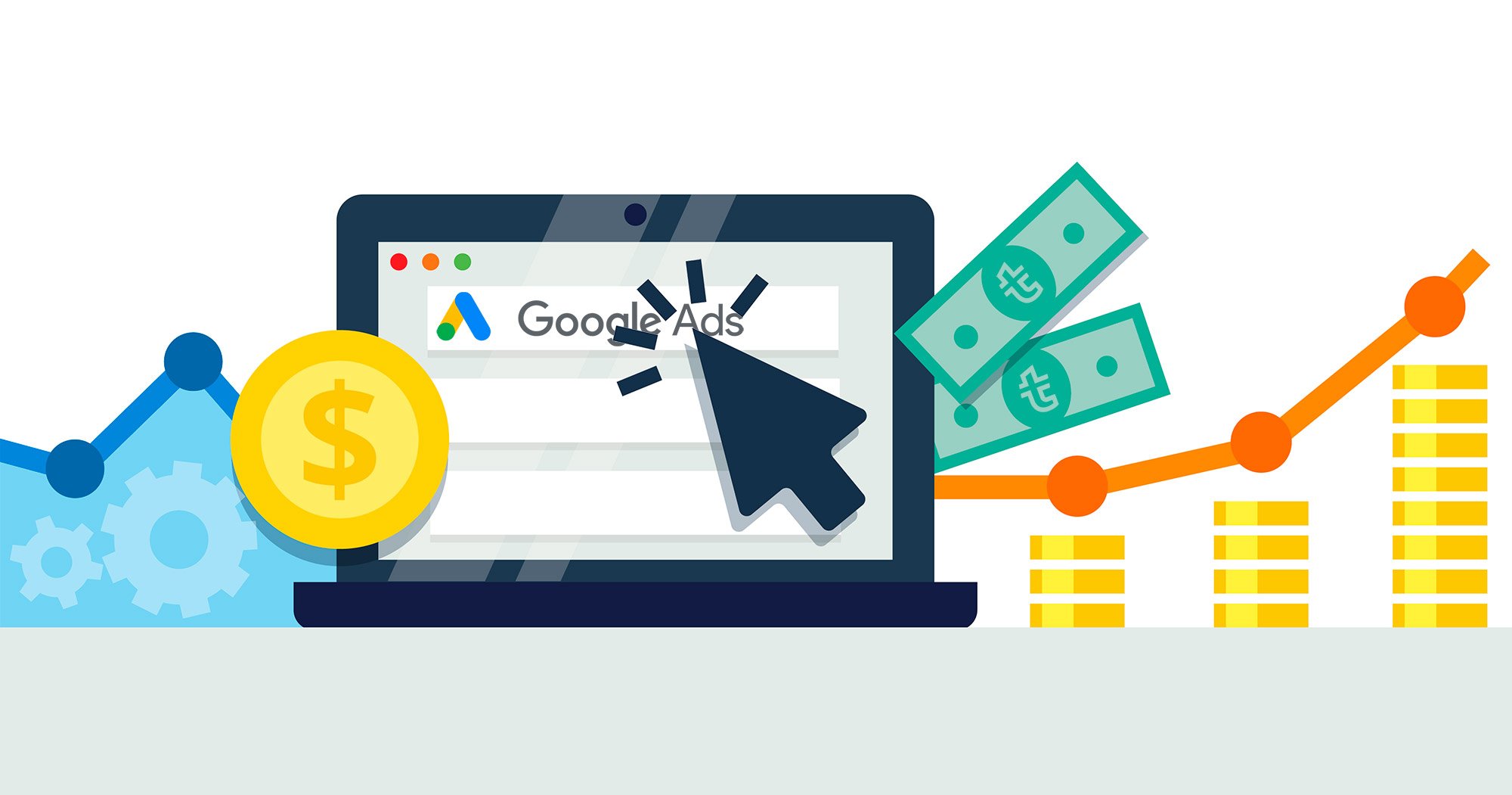
It’s ok to be conflicted on whether or not to integrate Google Ads affiliate marketing into your online business. But consider the following benefits you stand to gain by using Google Ads to promote affiliate offers to your audience:
Google is the most popular search engine
It’s no secret that Google is the most used search engine among Internet users. Many of those searching for products or services to solve their problems use the Google search engine. Therefore, by using Google Ads, you ensure that your affiliate promotions get displayed to potential customers who need the product.
Google Ads is the fastest way to appear at the top of the search results
Affiliate marketers pay Google to display their affiliate ads on the first results page. This in turn drives traffic to their affiliate website and subsequently the merchant’s page. Let’s state emphatically here that Google Ads is not a substitute for Search Engine Optimization.
However, to ensure prolonged success, affiliates must follow SEO strategies to compete with other affiliate marketers to promote their products and channels. Also, SEO is needed to make a complete ad campaign for your affiliate content.
Ability to determine your budget levels
Another benefit of Google Ads affiliate marketing is that you as an affiliate determine both your daily and monthly budget spending. You can set the overall campaign budget, daily spend level, and bid price.
Simply put; you compete with what you have.
Ability to Target specific Audience

Google Ads affiliate marketing gives affiliates the ability to target specific audiences. This can be done based on locations, demographics, interests, income levels, and much more.
You now have the power to create your own audience pool according to common traits and behavior. Think about those things when deciding who you want to target with your Google Ad.
Ability to Re-target potential customers
Remarketing is when you re-target customers who have clicked on your affiliate ads in the past or visited your site or the merchant site without making a conversion. This feature is extremely important to increase awareness of your services and achieve conversions from clicks to sales.
Ability to create Ads in Multiple Format
Google Ads allows you to create Ads using text, images, or visual content as well as video or audio-visual content. These special features can further help you match your campaign goals and target audiences.
Not only that, but Google Ads affiliate marketing also gives you tools to measure the performance of your ads and track all statistics generated from them.
Considerations before Starting Google Ads Affiliate Marketing
Making money with Google Ads affiliate marketing is great. The traffic is there and all you need is an awesome ad to capture your audience and lead to conversion.
The truth of the matter is that setting up a campaign is just the start and the real work comes after that.
Affiliates will have to constantly test their ads, keywords, and their own landing pages to optimize such campaigns and keep costs at a minimum.
Before plunging into the world of Google Ads affiliate marketing, we have created a checklist of factors to consider:
- Ensure the affiliate program allows for paid ads usage
- Always link to your own affiliate landing page and not directly to the merchant’s website
- Your landing page has to offer additional value to users, e.g. using your industry experience to create guides, tutorials, etc. if not Google will kick you out
- Choose your ad platform in this case, Google Ads
- Never use branded keywords most brands won’t allow you to
- review Ad performances regularly and optimize by testing;
- Always start with a small budget. Then scale up once you get positive results.
Starting up Affiliate Marketing with Google Ads
There are two methods to create a Google Ad campaign for affiliate marketers:
Smart Mode or Google Ads for beginners
This is a simplified version of Google Ads for beginners’ campaign. In this mode, affiliates define the goal of their campaign and places of advertising. Google then automatically manages the campaign and specifies its settings, such as Set bids, define and adjust keywords, define ad extensions, and more. This is the mode we will show in detail in our article.
Expert Mode
This is the Google Ads for affiliate marketers who know how to set up and manage Google Ad campaigns themselves.
Create an account on the Google Ads Network
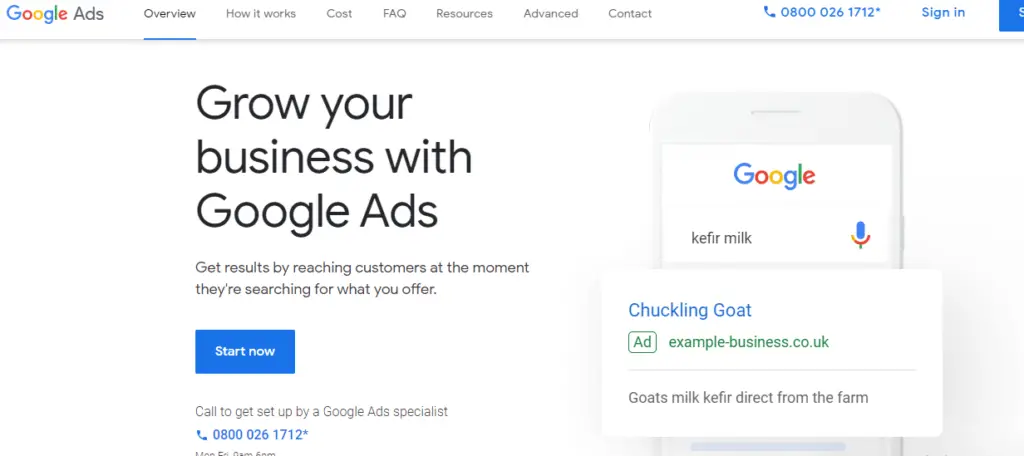
Login to ads.google.com using your Gmail account and register on the platform. If you are already signed in to Google, you will not need to sign in again.
Choose the main goal of your ad campaign
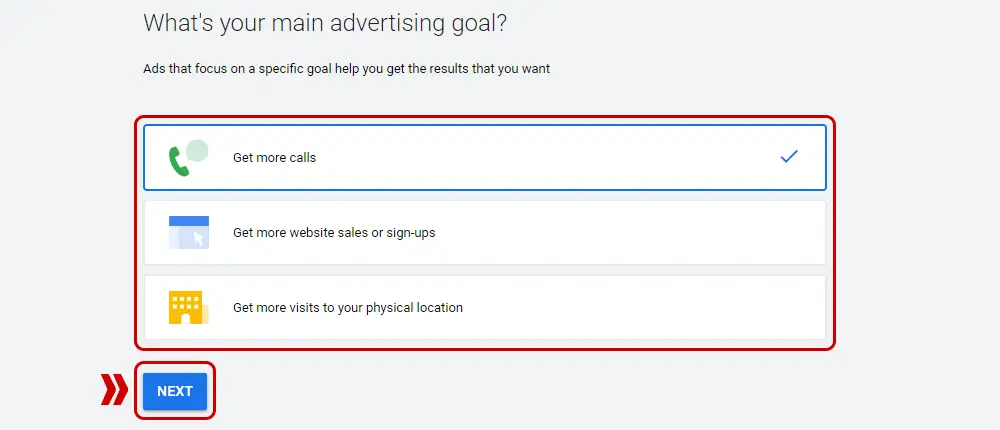
Select the direct campaign goal that you want to achieve. This is absolutely important and should be treated with the utmost regard. The campaign goal you choose will later determine the type of campaign, the Google networks to show the ad, and the proposed bids. There are three options to choose from:
- Receive more calls: If your conversion goal is for audience action to be to call your store, then this is the option to choose. This is targeted at mobile users who will view the phone number in the ad. When a user clicks on the ad, their mobile phone will dial the number.
- Get more sales or subscriptions on your website: The major purpose of Ads for Affiliate marketers is to get the user to go to your website. The target audience can either be new visitors or revisits. You want the right users to click through to increase clicks to sales.
- Attract more traffic to your store: Affiliate marketers can create a Google Ads campaign to increase traffic to the actual merchant site. In campaigns like this, tracking your visits and measuring your return on investment is a little more complicated, but not entirely impossible.
Describe your business
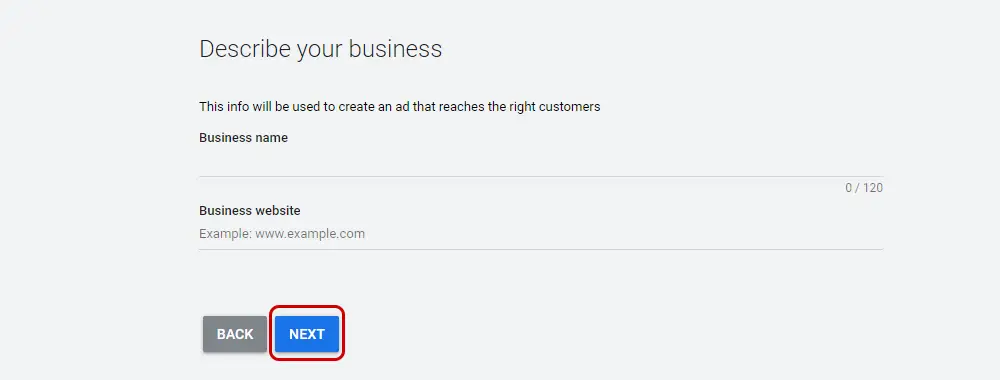
This is as simple as entering your business name and website or a channel. This information is extremely important because it will appear within the funded ads. This is where you can say you want to use Google Ads for affiliate marketing.
Enter the geographic location where the Google Ad will appears
Input which countries or regions you want your Google Ad to appear.
Google Ads location targeting allows your ads to appear in the specified geographic locations.
Asides from countries or areas within a country, you can include a radius around a location or location groups. Generally, your location should include places of interest, your business locations, and or tiered demographics.
Select your products and services
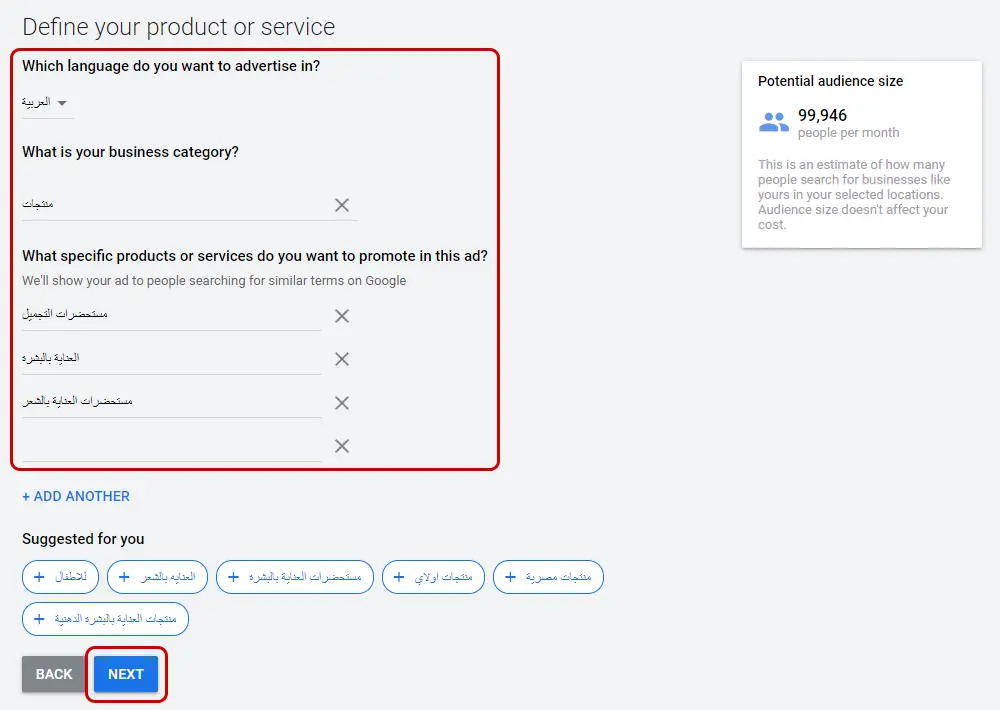
This is where an affiliate marketer; wants to input the products you promote. This setting directs Google Ads to target Google search queries that are related to the product or information specified.
The similarities or exactness between the audience’s search phrase and your Google Ad keyword can either be in one language, a few languages, or all languages.
Create your Google Ad
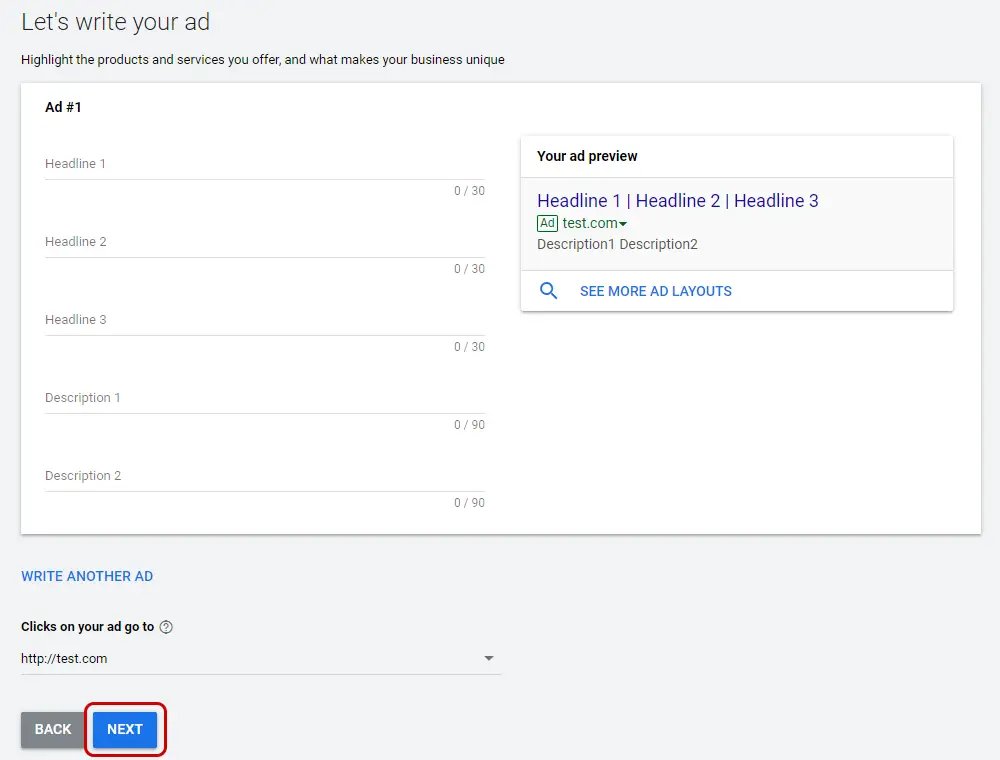
When writing your Google Ad, it’s a good practice to include your keyword terms into the text that is displayed to the user. This helps your relevance score.
Google advertising consists of three sections:
- Headline text: The headline text is made up of three headings of 30 characters each and separated by a vertical line. The maximum total of imputable characters is 90.
- Description: This describes the product or service you are marketing. It’s always nice to include a strong “call to action” to encourage your audience to perform the necessary conversion action. Google gives you the ability to create two descriptions of 90 characters each, for a total of 180 characters.
- URL: Specify the address of your site or the page you want the lead to go to when they click on your ad.
Set your spending budget
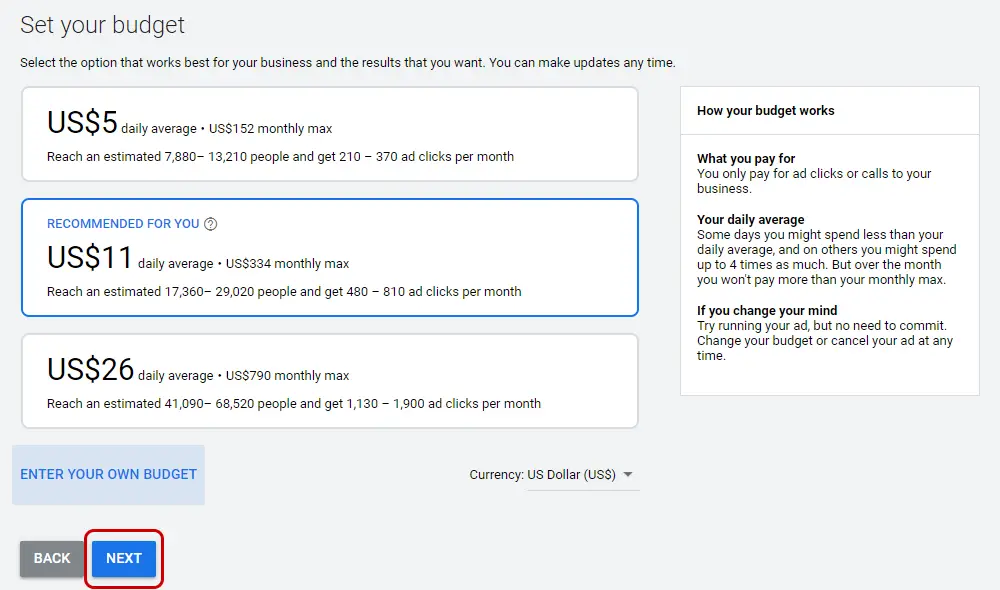
Affiliate marketers can select one of the proposed budgets or set their own. Marketers can as well update their budgets at any time.
Suggested Budget: This displays the average daily spending budget as well as the maximum spending per month of your Ads. The total spending for the month will never exceed your specified maximum budget.
Entering a Budget: affiliate marketers can define the budget spending they prefer. You can see the range of budgets your competitors are investing as a gauge.
Review your Ad
A key factor for affiliate marketers to keep in mind is to always review their Ads from time to time. This ensures they are in line with developing trends and are not obsolete.
You can adjust your campaign settings from the “Review Ads” page by clicking “Edit” on each level.
Select the payment method
Google Ads is an advertising platform and as such, you have to pay for their services. Simply select your country and determine your payment mode.
- Automatic payments: by selecting automatic payment, your Google Ads are paid for after your Google Ads have run. This is usually 30 days after your last automatic payment or when the maximum budget you allocated has been reached.
- Manual Payments: with this payment mode, your Google Ads are paid for before your Google Ads have run. Here, your Google Ads run until the money runs out.
Select your preferred payment methods such as a credit card, a debit card, or a bank account transfer.
Fill in your personal information, click on “Submit” and your first Google Ads for beginners is complete!
Launch your ad campaign
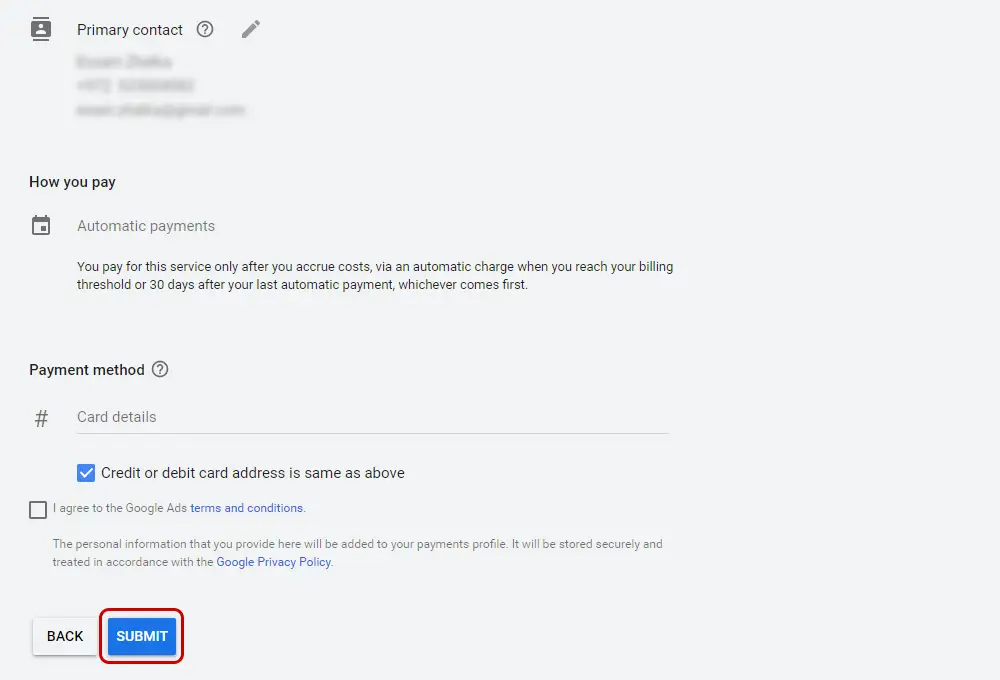
All the affiliate marketer has to do next is to launch the Google Ads for beginners’ campaign.
You can track how well your campaign is performing as well as other statistics at all levels on the homepage of your Google Ads account. Do this often to get more value out of your investment in the ads.
Optimize Your Google Ads for Better Conversion Rate
Organize your campaigns
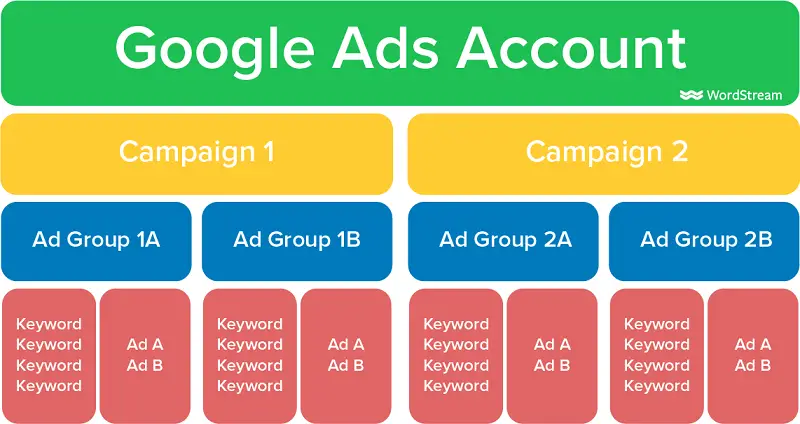
With Google Ads for affiliate marketing, you first need to create a campaign. This campaign is the designated home to your ad groups and in turn, your ad groups are the container for your keywords.
When it comes to targeting, you essentially want to create separate campaigns for at least distinct geographical areas. By doing this, you are able to narrow down which countries comprise the most attractive segments for your ads. Keeping them separate makes it easier for you to keep an eye on and control them.
The next step is to create ad groups for each set of keywords. Most likely you will want to focus more on targeted keywords with high purchase intent instead of general keywords.
Consider organizing your campaigns the way a front-end web developer organizes pages on a website.
Build compelling landing pages
Truth be told, there is no Google Ads affiliate marketing without a website or at least a landing page. An affiliate landing page is the site page audiences land when they click the link on your ad.
It’s also where you as an affiliate create and upload meaningful quality content related to the product you are promoting and insert your unique referral links to the merchant’s website. As an affiliate, you add an extra step to the sales funnel.
This is why if you want to run a successful Google Ads campaign, your landing page must contain essential content and provide unique value for your audience.
One way to go about this is to view the landing pages of some of the top affiliates. Study their content and how they present the affiliate offer. You will surely learn one or two things.
Maintain a high relevance score
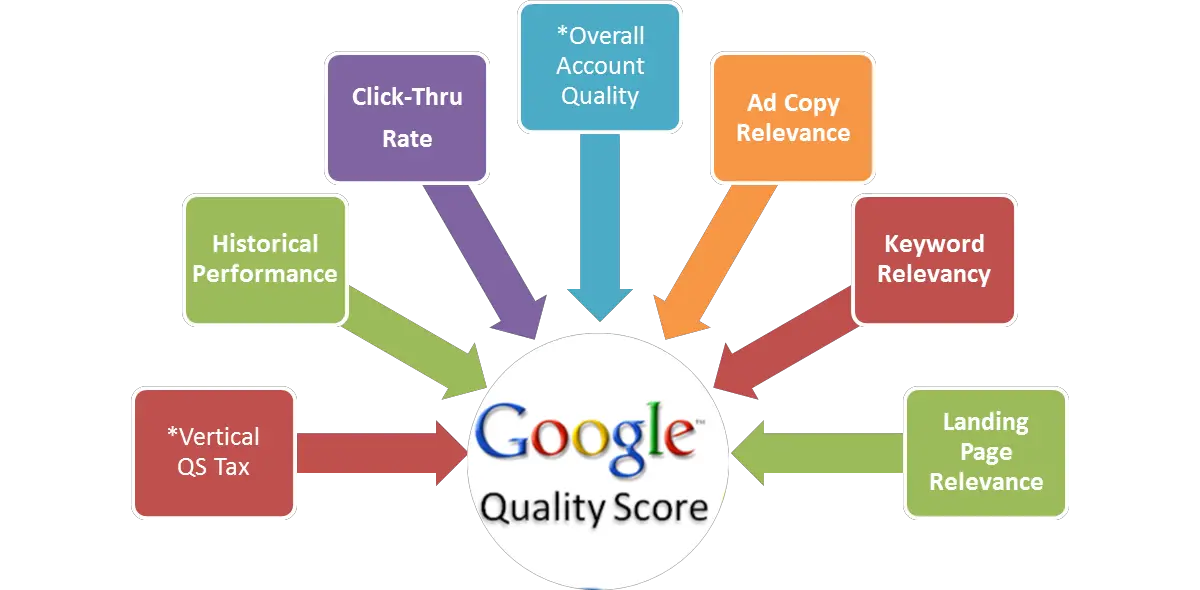
Google Ads platform usually rates its user’s advert by the quality and relevance of your ads and keywords.
Factors that affect your rating score include your Ads CTR, the quality and relevance of your landing page, the relevance of each keyword to its ad group, your account’s performance, and your ad text.
Quality score affects your ad’s visibility in the search results and it’s important to always improve on it.
By simply optimizing your landing page, refining your ad text, adding negative keywords to exclude irrelevant queries, and organizing keywords into relevant groups, you can improve your score.
Conclusion
To earn money with Google Ads affiliate marketing, you certainly will have to spend money and often target locations that the merchant’s in-house advert team isn’t targeting. Maintaining a balance between the money you spend on pushing your ads to viewers and your earnings from said conversions is important.
The key to being successful here is for you as an affiliate marketer to run transparent ad campaigns. This means selecting the right products to promote, using the right keywords, and creating the optimal ads. Then create an awesome yet useful and effective landing page that provides relevant content for potential customers. Stay truthful in your content and don’t over-sensationalize.



